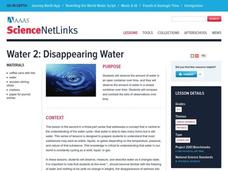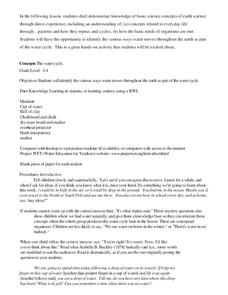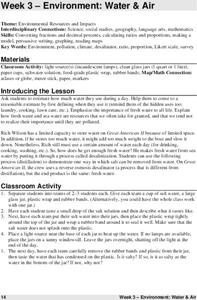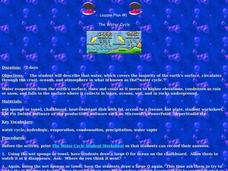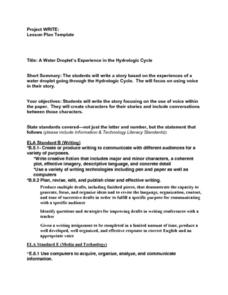Nuffield Foundation
Observing Water Moving Through Plants
We know plants assist in the water cycle, but how do plants get water from the ground into the air? Through a series of demonstrations or labs, scholars observe the movement of water through plants. They microscopically view the cells...
Curated OER
Water
Students conduct a series of investigations on the unique properties of water. In this general science lesson, students explain what causes water's surface tension. They explain the different stages in the water cycle.
Curated OER
Disappearing Water
Students explore the water cycle. In this earth science lesson, students observe and measure water in a closed container and in an open container. Students record their observations and compare their sets of data to draw conclusions...
Curated OER
Models of the Water Cycle
Students describe and review the stages in the water cycle. In groups, they build their own models of the water cycle and demonstrate where the water goes in a closed system. They answer discussion questions after the experiment to end...
Curated OER
Exploring the Science of Water in Art: Water Cycle Lesson Plans
Water cycle lesson plans provide an opportunity for teachers to collaborate, and students to discuss this important resource.
Curated OER
The Water Cycle
Students access prior knowledge of the water cycle by completing a KWL. In this water cycle lesson, students follow the movement of water through the water cycle.
Curated OER
The Water Cycle
Students identify the various ways water move throughout the earth as part of the water cycle. For this science lesson, students gain a knowledge of basic science concepts related to everyday life through patterns and how they repeat as...
Curated OER
How Much Salt is in the Gsl Water?
Fourth graders study the water cycle and the different processes that are involved, like precipitation, evaporation, etc. They conduct an experiment observing the water cycle in action and write a hypothesis, observations and...
Curated OER
The Water Cycle
Students develop a better understanding of the need to conserve our renewable resources. In this water cycle lesson plan students take notes, complete a guide sheet and illustrate the water cycle.
Curated OER
Using Environmental Models to Determine the Effect of Acid Rain on an Ecosystem
Demonstrate to your middle school science learners how chalk breaks down in a weak acid. Discuss what affects acidic rain might have on ecosystems. Lab groups then choose one of two questions: "How does acid precipitation affect an...
Curated OER
Environment: Water & Air
The introduction to the instructional activity mentions a sailor's limited capacity to store drinking water on his ship. Pupils then set up an overnight experiment to remove freshwater from salt water by distillation. There is a math and...
Curated OER
Water and Ice
Students explore water and ice. In this physical science lesson, students participate in a science inquiry and observe the characteristics of ice and water. Students compare the differences between a solid and liquid and record their...
Curated OER
Water Magic
Young scholars conduct experiments with ice, water and steam to observe the water cycle. They discuss substances that water accumulates from the Earth as it moves through its cycle.
Curated OER
Does the Sidewalk Drink Puddles?
Students participate in an experiment about evaporation. In this water cycle lesson, students use water, thermometers, and measuring tools to make a puddle and measure the size four times throughout the day. Students discuss their data...
Curated OER
Water in the Air?
In this science worksheet, learners collaborate as a group of 4 to conduct a science investigation about the water cycle. Students read about the specific job responsibilities for each team member and record their findings on this sheet.
Curated OER
Water and Ice
Students investigate how water goes from a solid to a liquid then back again. In this experimental lesson students conduct their own experiment and see how water changes form.
Curated OER
The Water Cycle
Students conduct experiments involving different parts of the water cycle. In this water cycle lesson, students conduct five simple experiments to demonstrate how the water cycle works. The results of each experiment is discussed as a...
Curated OER
The Water Cycle: A Repeating Pattern in Nature
Students are introduced to the terms related to the water cycle in their native language. In groups, they describe the steps of the cycle using different materials found in their art classroom. They describe how energy helps water...
Curated OER
Dewey and Chemistry: The Water Cycle Revisited
Pupils undertake a series of experiments related to the water cycle. All experiments use John Dewey's experiential philosophy as their bases. Each lesson is clearly based on philosophy and attempts to be relevant.
Curated OER
Water Cycle -- Presentation Teaching Model
Students continue their examination of the water cycle. In groups, they present their findings to the class after researching a specific topic related to the water cycle. They spend the rest of the lessons asking questions and answering...
Curated OER
The Water Cycle
Students explore the water cycle. In this water cycle lesson, students experiment with a variety of activities to discover what happens during the water cycle. Students create their own animated versions of the water cycle...
Curated OER
Water Cycle Stories
Students explore the water cycle. In this water cycle lesson, students simulate the water cycle by placing an ice cube in a Ziploc bag and observing the changes which occur over time. Students record the mass of the Ziploc bag and record...
Curated OER
Water: The Incredible Resource
Students understand the importance of water in any ecosystem. In this water lesson plan, students recognize where water is found, the type of water found, and how water is changed in the water cycle. Students complete worksheets...
Curated OER
A Water Droplet's Experience in the Hydrologic Cycle
Young scholars write a story from the perspective of a water droplet on a journey through the water cycle. They use the 6+1 Traits writing method to focus on voice in the writing as they create characters that their water droplet has...




